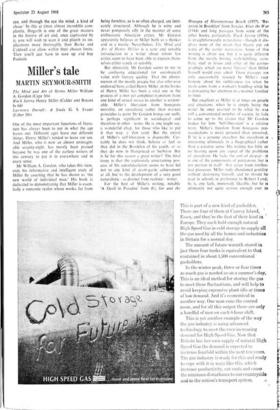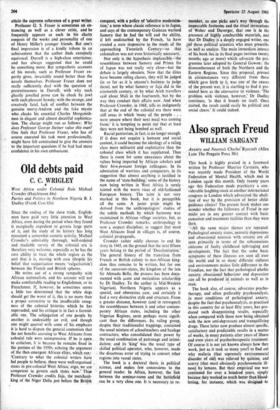The Mind and Art of Henry Miller William A. Gordon
(Cape 30s)
Miller's tale
MARTIN SEYMOUR-SMITH
Black Spring Henry Miller (Calder and Boyars 8s 6d) Lawrence Durrell: A Study G. S. Fraser (Faber 30s)
One of the most important functions of litera- ture has always been to put in what the age leaves out. Different ages leave out different things; Henry Miller's tended to leave out sex. And Miller, who is now an almost unimagin- able seventy-eight, has mostly been praised because he was one of the earliest writers of this century to put it in everywhere and in every sense.
Mr William A. Gordon, who takes this view, ends his informative and intelligent study of Miller by asserting that he has shown us 'the new world of individual man.' His book is dedicated to demonstrating that Miller is essen- tially a romantic realist whose works, far from
being formless, as is so often charged, are intri- cately structured. Although he is witty and never pompously silly in the manner of some enthusiastic American critics, Mr Gordon apparently believes in Miller both as• a thinker and as a mystic. Nevertheless, The Mind and Art of Henry Miller is a sane and sensible introduction to a writer about whom few critics seem to have been able to express them- selves either sanely or sensibly.
But ultimately Mr Gordon seems to me to be confusing educational (or sociological) value with literary quality. That the pheno- menon of the mostly priapic but also otherwise endowed hero, called Henry Miller, in the books of Henry Miller has been a vital one in the process of a (not yet complete) transition from one kind of sexual mores to another is undeni- able. Miller's liberation from bourgeois morality, on anarchistic rather than marxist principles (a point Mr Gordon brings out well), is perhaps significant in sociological--and therefore in other— terms. He is, one might say, a wonderful chap: for those who like to put it that way, a Zen saint. But the extent of Miller's self-liberation is disputable. Cer- tainly he does not think, behave or feel as they did in the Brooklyn of his youth, or as they do now in Hampstead or Surbiton But is he for this reason a great writer? The final irony is that the explosively entertaining pro- cess of his autodidacticism seems to have led not to any kind of avant-garde achievement at all, but to the development of a very good naturalistic—as distinct from realistic—writer.
For the best of Miller's writing, notably `A Devil in Paradise' from Big Sur and the Oranges of Hieronymous Bosch (1957), 'Re- union in Brooklyn' from Sunday After the War (1944) and long passages from some of the other books, particularly Black Spring (1936), is straightforwardly naturalistic—though it dis- plays none of the strain that theory put on some of the earlier naturalists. Some of this writing is about sex, but it is quite different from the mostly boring, wish-fulfilling, acro- batic stuff in Serifs and other of the porno- graphies. which are more 'literary' than Miller himself would ever admit. Those passages are only occasionally rescued by Miller's racy honesty about his ruthlessness (as when he steals coins from a woman's handbag while he is distracting her attention in a manner familiar to him).
But excellent as Miller is at times on people and situations, when he is simply being the writer he once yearned to be while he was still a conventional member of society. he fails to come up to the claims that Mr Gordon makes for him. 'Self-liberation' is a relative term: Miller's freedom from bourgeois pre- occupations is more personal than universal. If he is a genuine anarchist, his anarchism is interesting ultimately in a biographical rather than a creative sense His writing has little or no bearing upon any aspect of the problems of anarchism. He lacks the sort of despair—it is one of the components of puritanism, but is not puritan in itself - that arises from intellec- tual processes. Miller truly abandoned gentility without destroying himself, and he should be read in schools in preference to Robert Lynd; he is, one feels, immensely likeable, but he is ultimately not quite serious enough ever to attain-the supreme coherence of kgreat writer.
Professor G. S. Fraser is sometimes an en- trancing as well as a clever critic, and he frequently appears as such in his chatty exegesis of the works and personality of one of Henry Miller's younger friends., But one's final impression is of a kindly tribute to an achievement that the author finds extremely equivocal. Durrell is a high-class entertainer, and has always suggested that he could be something more. But sympathetic accounts of his novels, such as Professor Fraser ex- pertly gives, invariably sound better than the novels themselves. Professor Fraser does not really sufficiently. deal with the question of pretentiousness in Durrell; with why such ghastly jewelled prose can lie cheek by jowl with such pleasant bawdy; with the strange, and creatively fatal, lack of conflict between the genuine merry-Andrew and the fake mystic who cloaks his essential Charles Morganish- ness in elegant and almost deceitful sophistica- tion. The charge might run as follows : Why does Professor George Steiner value this man? One feels that Professor Fraser, who has of course executed his task most professionally, might have felt constrained to give the answers to the important questions if he had had more confidence in his own enthusiasm.



































 Previous page
Previous page